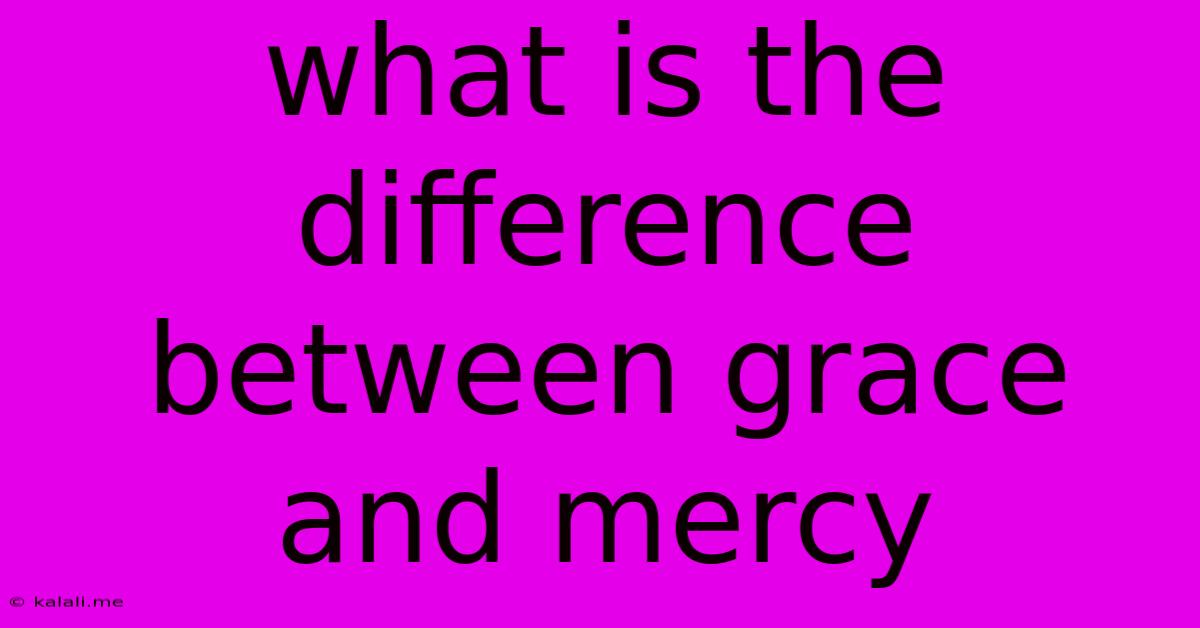What Is The Difference Between Grace And Mercy
Kalali
Jun 09, 2025 · 3 min read

Table of Contents
Grace vs. Mercy: Understanding the Nuances of God's Unconditional Love
Understanding the difference between grace and mercy can be challenging, as both represent God's boundless love and compassion. While often used interchangeably, they possess distinct meanings that enrich our understanding of God's nature and our relationship with Him. This article explores the subtle yet significant distinctions between grace and mercy, offering a clearer perspective on these vital theological concepts.
What is Grace?
Grace, in its simplest form, is undeserved favor. It's the unmerited gift of God's love and benevolence bestowed upon humanity, despite our shortcomings and unworthiness. We receive grace not because of anything we've done to earn it, but solely because of God's inherent goodness and desire for a relationship with us. It's the enabling power that empowers us to live a life pleasing to God, overcoming our inherent weaknesses and sinful natures. Think of it as a proactive act of God's love, initiating reconciliation and offering a path to salvation.
Key aspects of Grace:
- Unmerited: Grace is freely given; we don't earn it through good works or religious practices.
- Enabling: Grace empowers us to live a righteous life, providing strength and guidance.
- Transformative: Grace changes our hearts and minds, leading us towards holiness and a closer relationship with God.
- Prevenient: Grace precedes our faith, preparing our hearts to receive God's love.
What is Mercy?
Mercy, on the other hand, is compassionate forgiveness shown to someone who deserves punishment. It's the act of withholding deserved judgment or retribution. We receive mercy because we have failed, sinned, or fallen short of God's perfect standard. It's a reactive response to our failings, an act of forbearance and leniency from a just God.
Key aspects of Mercy:
- Forgiveness: Mercy involves the cancellation of punishment or penalty.
- Compassionate: Mercy is motivated by empathy and understanding of our frailties.
- Reactive: Mercy is a response to our wrongdoing, unlike grace which is proactive.
- Relief from Punishment: Mercy alleviates the consequences of our sins.
The Interplay of Grace and Mercy:
While distinct, grace and mercy are deeply intertwined. Grace initiates the process of reconciliation, offering a pathway to forgiveness. Mercy then becomes the active demonstration of God's grace, extending forgiveness and preventing the just consequences of our actions. We can see this interplay clearly in the Christian faith, where God's grace enables us to repent and receive His mercy, thereby experiencing salvation.
Example: Imagine a person who has committed a serious crime. Grace would be the offer of pardon, completely undeserved. Mercy would be the act of the judge withholding the full extent of the legal punishment. Both grace and mercy are necessary for the individual's redemption.
In Conclusion:
Grace and mercy are both essential aspects of God's love, working together to restore our relationship with Him. Grace is the undeserved favor that initiates the process, while mercy is the compassionate forgiveness that follows. Understanding these distinct yet interconnected concepts provides a richer appreciation for the depth and breadth of God's unconditional love and the transformative power of His grace. This understanding can deepen our faith and motivate us to live a life that reflects His goodness.
Latest Posts
Latest Posts
-
How To Wire Three Way Switches
Jun 09, 2025
-
How Much Dried Minced Onion Equals 1 Onion
Jun 09, 2025
-
Why Does Frodo Leave In The End
Jun 09, 2025
-
You Made Your Bed Now Lie In It Similar Quotes
Jun 09, 2025
-
Minecraft Do Shulker Boxes Disappear When Ou Die
Jun 09, 2025
Related Post
Thank you for visiting our website which covers about What Is The Difference Between Grace And Mercy . We hope the information provided has been useful to you. Feel free to contact us if you have any questions or need further assistance. See you next time and don't miss to bookmark.